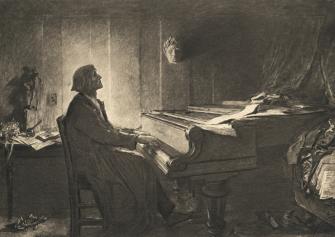Catalogue of sources and works by the composer Franz Liszt digital
Press Release No. 5/2022
17 January 2022
German Research Foundation funds long-term project to establish a catalogue of sources and works by the composer
A long-term project under the leadership of Prof. Dr Christiane Wiesenfeldt from Heidelberg University’s Department of Musicology aims to compile a digital catalogue of all sources and works by composer Franz Liszt (1811 to 1886) and make them freely available online. The Heidelberg musicologist underlines that this is meant to “fill a central gap in music research regarding the 19th century”. Also involved are the Saxon State and University Library (SLUB) in Dresden and the Goethe and Schiller Archive in Weimar. The German Research Foundation is funding the project “Digital Liszt Sources and Works Catalogue (LisztQWV)” for a maximum of twelve years. The first, three-year project phase has now been approved, with funding totalling approximately 1.2 million euros.


The digital Liszt portal will be jointly developed at three project locations − Heidelberg, Dresden and Weimar. Through this collaboration, the composer’s works and their versions are to be made visible and available to research. The researchers also plan to create a visualisation of the frequently complex connections between the works. “The portal will form an important basis for Liszt research and give it sustainable momentum. At the same time, it is meant to provide the interested public with a new picture of a composer whose contours have so far been insufficiently clear,” explains Prof. Wiesenfeldt. Through a digital presentation with open access, the research results will not only be freely accessible but can also be used in follow-up projects in an optimum way.
“Franz Liszt is the only prominent 19th-century composer for whom there is no complete catalogue of sources and works. The reason may also be that Liszt’s output is especially resistant to a clear-cut definition of pieces. With new arrangements and adaptations, new creations, performances with variations, changing sources of literary inspiration – hardly a catalogue of a Romantic composer is as elusive, colourful and fluid as that of Liszt,” says Christiane Wiesenfeldt. The digital Liszt portal is designed to map this complexity and to highlight Liszt’s multi-facetted inspiration from many different angles. This will also enable users to gain a new understanding of composing in the 19th century.
Under the leadership of Prof. Wiesenfeldt, the main research location is Heidelberg University’s Department of Musicology; funding of approximately 663,000 euros has been allocated for the studies carried out at Ruperto Carola. At SLUB Dresden, a team led by Prof. Dr Barbara Wiermann will develop the information technology, and a qualification position in the field of Digital Musicology is also planned. The Goethe and Schiller Archive will work directly on the sources of the Liszt estate, under the guidance of its director, Prof. Dr Marcel Leppert. The project is scheduled to start in April 2022.